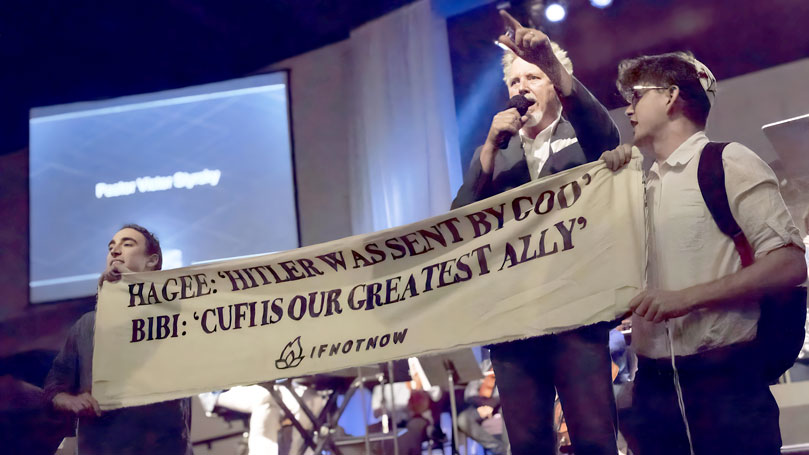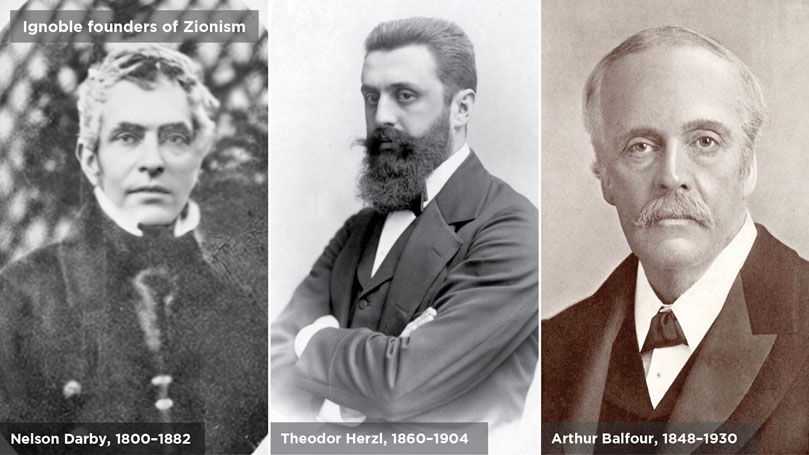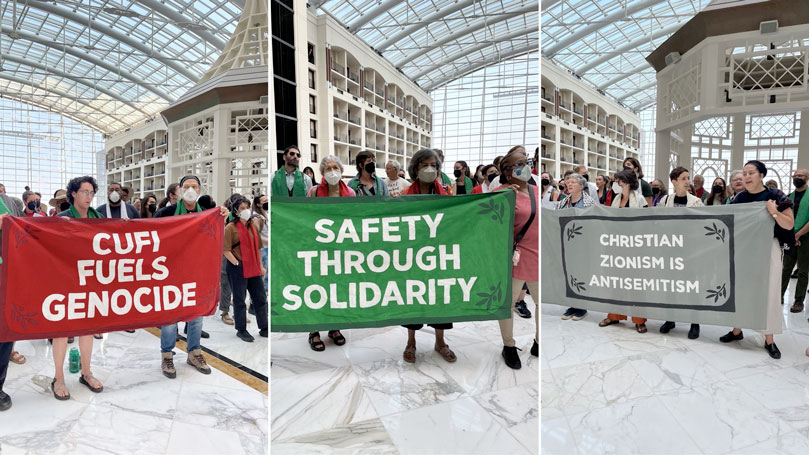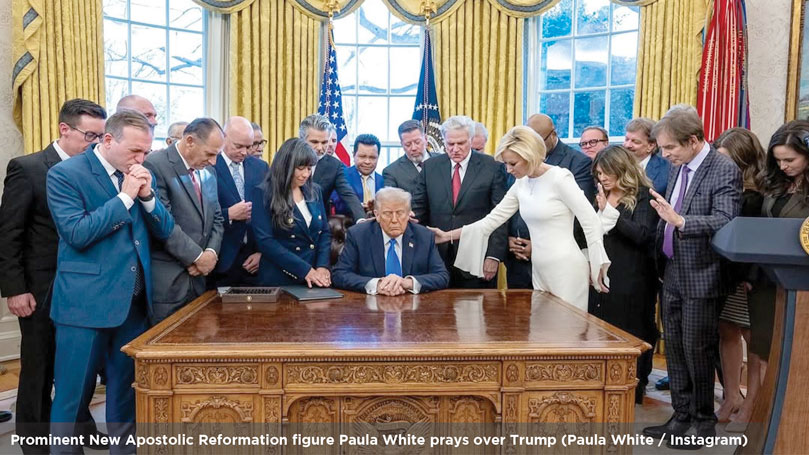
Many might wonder how President Donald Trump, a man adored by Nazis and widely known to be anti-Semitic, is now leveraging his ostensible support for Zionism and the supposed “need to protect Jews” as a pretext to undermine constitutional rights and disappear dissenters. Yet, Trump’s fusion of hatred for Jewish people and Zionism is far from unique.
Elon Musk, who promotes the “great replacement conspiracy theory” — a racist notion rife with antisemitism, including the idea that a clandestine Jewish cabal is conspiring to destroy “white America” — and who uses the Nazi salute at rallies, is a Zionist. Steve Bannon, a vocal advocate of Christian nationalism and an acknowledged antisemite, is a Zionist. Richard Spencer, the notorious neo-Nazi who organized the 2017 “Unite the Right” rally, where chants of “Jews will not replace us” echoed through Charlottesville, is another prominent anti-Semitic Zionist.
This seemingly contradictory combination of Jew hatred and Zionism — an ideology ostensibly intended to empower Jews through nationalism — is not confined to the United States. Across Europe, many of the most influential fascists and neo-Nazis are Zionists and strong supporters of Israel.
Hungarian President Viktor Orban, notorious for his far-right rhetoric and policies, is one of Israel’s most steadfast allies in Europe. The rebranded Swedish Nazi party, now known as the Sweden Democrats, has recently established friendly relations with the Israeli government. Italy’s Brothers of Italy Party, which traces its ideological lineage to Mussolini’s original Fascist Party, supports Israel and Zionism. Similar far-right support can be found within France’s National Rally Party, Spain’s Vox Party, Romania’s AUR, and many far-right factions across the continent.
Under the Trump–Musk axis, Christian Zionism has become a prominent feature of fascism in the United States.
Although Zionism is often presented as a Jewish political movement, the reality is that most Zionists worldwide are Christians, many of whom harbor deeply anti-Semitic beliefs. The earliest proponents of Zionism were not Jews but Christian antisemites. Today, under the Trump–Musk axis, Christian Zionism has become a prominent feature of fascism in the United States.
Christian roots
The “official history” of Zionism’s establishment usually follows a familiar narrative: After witnessing the anti-Semitic persecution of a French military officer during the 1894 Dreyfus Affair, Theodor Herzl, an Austrian Jewish journalist, concluded that Jews could never be safe among non-Jews. Returning to Austria, he authored his manifesto, Der Judenstaat (The Jewish State), the supposed “founding document” of modern Zionism, asserting that a Jewish state was necessary to protect Jews from antisemitism.
While compelling, this version of history omits a crucial fact: modern Zionism was established decades earlier by Christians. Motivated by a combination of religious fundamentalism and anti-Semitic hatred, these Christians believed that relocating the world’s Jews to Palestine would resolve both their earthly and spiritual “problems.”
In the 1830s, an English preacher named Nelson Darby founded a new Christian theological framework called “dispensationalism.” Through literal interpretations of Biblical passages, followers of dispensationalism believed that it was necessary for Jews to “return to the Holy Land” to bring about the second coming of Christ. According to this theology, once the Jews returned to Palestine, they would ultimately be annihilated for rejecting Jesus as the Messiah, paving the way for Jesus to establish a Christian kingdom on Earth.
Dispensationalism quickly gained popularity among evangelical Churches, especially in the United States and Darby’s home country of Britain. In Britain, the anti-Semitic political elite recognized that this new theology provided a convenient solution to the so-called “Jewish question.” They saw dispensationalism as a way to rid their country of its Jewish population by encouraging emigration to Palestine.

It is important to note that as with Herzl’s later Jewish Zionism, the vast majority of Jews overwhelmingly rejected the idea that they should leave their home countries, where many of them lived for centuries, for far-off Palestine.
Mainstream history often points to Arthur Balfour as one of Zionism’s great heroes, painting him as a friend to the Jewish people. In 1917, as foreign secretary, during World War I, Balfour promised prominent Zionist Walter Rothschild that Britain would help establish a Jewish state in Palestine once the British finished conquering it from the Ottoman Empire. To this day, Zionists consider it one of the most pivotal legal documents in the history of their movement.
However, many would be surprised to learn that Balfour was no friend of the Jews; he was, in fact, a fervent antisemite.
At the dawn of the 20th century, most European Jews lived under the rule of the Russian Empire, where they endured systematic persecution. Under the Tsar, Jews were mass murdered in violent pogroms, prohibited from living outside the Pale of Settlement, forcibly conscripted and abused by the Russian military, and denied fundamental rights. Many Jews sought refuge in what they believed to be the more liberal and welcoming West.
But the anti-Semitic elite in countries like Britain were terrified of an influx of Jews into their “Christian” countries. In 1905, the British government passed the Aliens Act, a law designed to curb immigration, particularly Jewish immigration. Balfour, the supposed “friend of the Jews,” was one of the Act’s more enthusiastic supporters.
Like many prominent antisemites, Balfour recognized Zionism as a convenient tool for achieving his real goal: ridding Britain of its Jewish population.
Balfour didn’t suddenly have a change of heart in the twelve years between his support of Britain’s Aliens Act and the 1917 Declaration. Like many prominent antisemites, he recognized Zionism as a convenient tool for achieving his real goal: ridding Britain of its Jewish population. Figures like Balfour saw support for Zionism, particularly Christian Zionism, as a way to address the so-called “Jewish question” by encouraging Jewish emigration to Palestine, thus emptying Europe of its Jewish population.
The U.S. variant
Today, the United States is the political epicenter of the world’s wealthiest and most powerful evangelical churches. Christian Zionists across the United States continue to support Zionism for the same reasons British Christian Zionists supported it before them; they want “to keep America white” and hasten the “Second Coming of Christ,” which they believe will rid the world of all Jews once and for all.
In U.S. political discourse, discussions about Zionism often center on the lobbying efforts of the American Israel Public Affairs Committee (AIPAC). Such discussions claim that the predominantly Jewish organization uses its great financial resources to buy support for Israel from U.S. politicians. However, what many overlook, or deliberately ignore, is that AIPAC is not the largest Zionist lobbying group in the United States. That distinction belongs to Christians United for Israel (CUFI), a Christian Zionist group led by extremist televangelist John Hagee.
Furthermore, a substantial portion of AIPAC’s funding comes from Christian Zionists. Today, AIPAC boasts roughly 100,000 members, while CUFI claims a membership of over five million. CUFI engages in extensive grassroots activism, mobilizing Christian communities across the United States to promote its Christian Zionist agenda.

CUFI is not alone. Numerous other Christian Zionist organizations actively lobby and rally support for their extremist Zionist platform. These include Ralph Reed’s Faith and Freedom Coalition, the notorious Family Research Council, and the American Center for Law and Justice, founded by televangelist Pat Robertson. Their influence continues to shape Republican policy and the broader political landscape.
Reagan’s evangelical–GOP alliance
In the early 1980s, as Ronald Reagan assumed leadership of the Republican Party, he forged an alliance between powerful financial interests and evangelical churches. Seeking to expand their electoral base, the Republican National Committee (RNC) recognized that evangelicals, often voting as a cohesive bloc, could be a formidable force at the ballot box.
In exchange for this partnership, the Republican Party officially adopted several evangelical political platforms, including opposition to abortion, increased anti-LGBTQ rhetoric, resistance to secularism, promotion of school prayer, and a staunchly pro-Israel stance rooted in Christian Zionism.
Some recognized the danger posed by this unholy alliance of finance capital and militant Christianity. Gus Hall, then General Secretary of the Communist Party USA (CPUSA), described it as having a “whiff of fascism.” Alarmed by the rise of this and other developments, Hall and other CPUSA leaders shifted the Party’s political focus from running CPUSA candidates to supporting mainstream candidates most likely to defeat increasingly far-right Republicans, prioritizing coalition-building efforts aimed at defeating what they recognized as a growing fascist threat.
Reagan collaborated closely with prominent evangelical leaders like Jerry Falwell and Pat Robertson, both of whom significantly influenced his administration’s policies toward Israel. Despite growing international consensus around finding a peaceful resolution to Palestinian statelessness, the Reagan administration rejected the idea of an independent Palestinian state. Adhering to Christian Zionist doctrine, Reagan advocated Jewish dominance over the entire biblical Holy Land.
Reagan was also the first U.S. president to advocate moving the U.S. embassy to Jerusalem — a long-standing Christian Zionist goal that he failed to achieve, but later realized by his ideological successor, Donald Trump.
After Reagan, George H.W. Bush pushed back against the influence of Christian Zionism and paid for it dearly with the loss of the evangelical voter base. Bush Senior advocated for peace negotiations between Israel and the Palestinian Liberation Organization, in the form of the Madrid Conferences. Pat Robertson harshly criticized the administration for this stance, contributing to Bush’s failed re-election.
President George W. Bush was seen as considerably more religious than his father and garnered much support from the Christian right, specifically CUFI. He often spoke about his belief in biblical prophecy and how it influenced his worldview. Bush Jr. believed Israel to be a part of the U.S.’ “crusade” against Islamic terror, and his administration gave significant financial and military aid to Israel, despite Israel’s consistently breaking international law with the mass expansion of its settlements and use of its military against civilian targets.
Trump, MAGA, and Christian Zionism
When Donald Trump took control of the Republican Party, many commentators predicted he would struggle to gain support from evangelicals due to his coarse, overtly “un-Christian” lifestyle. To counter this challenge, Trump forged strategic alliances with some of the most extreme Christian Zionist organizations, including the New Apostolic Reformation (NAR), an organization the Southern Poverty Law Center has described as “the greatest threat to American democracy that most people have never heard of.”

The NAR presents itself as a militant force dedicated to establishing Christian dominion over all aspects of society. This vision of religious control resonated with many of Trump’s allies, such as Mike Johnson and Marjorie Taylor Greene, who have also embraced NAR’s doctrine and goals. With the support of the NAR and other Christian Zionists, Trump’s first administration advanced one of the most radical Christian Zionist agendas in modern history.
One of the most visible expressions of this agenda occurred in 2018, when Trump moved the U.S. embassy in Israel from Tel Aviv to Jerusalem, completing a process initiated by Reagan nearly four decades earlier. The following year, his administration went further by formally recognizing Israel’s illegal annexation of the Syrian Golan Heights. Breaking with the long-standing policy of every previous presidential administration, Trump then declared that Israeli settlements in the West Bank did not violate international law, despite their clear breach of multiple established international statutes.
Trump’s enthusiastic support for Israel’s domestic policies was matched by his unwavering endorsement of its foreign policy objectives, particularly those aimed at countering Iran. During a 2019 interview with the Christian Broadcasting Network, then-Secretary of State Mike Pompeo was asked about the Trump administration’s policies toward Israel and replied, “the Lord is at work here.” This invocation of divine approval highlights the Trump administration’s efforts to align its foreign policy with the interests of evangelical Christian Zionists.
Further cementing these alliances, Trump used U.S. influence to pressure several Arab states to abandon their long-standing commitment to withholding recognition of Israel until a Palestinian state was established. Through the so-called “Abraham Accords” — a name deliberately invoking biblical symbolism — the United Arab Emirates, Bahrain, Morocco, and Sudan all unconditionally normalized relations with Israel. This diplomatic move was presented as a triumph for peace, but it also represented a break from the previous consensus among Arab states that recognition of Israel should only follow a resolution of Palestinian statelessness.
These foreign policy moves solidified Trump’s standing among Christian Zionists, who came to view him as an almost messianic figure. Not only did they disregard his irreligious past, but many of these religious voters embraced him and began to see him as chosen by God to bring about prophetic events and protect Israel. This perception of Trump as a divinely appointed leader has only intensified during his second term, as he continues to exploit their unwavering support to advance an increasingly fascist agenda.
Leveraging his deep ties to Christian Zionist networks, Trump has openly disregarded constitutional norms to enforce policies that prioritize his vision of power and control. Often justified under the pretense of countering anti-Semitism, defending Zionism, and shielding Israel from criticism, these actions have included the persecution, arrest, and even disappearance of prominent critics of Israel and U.S. support for Israeli policies.
Christian Zionism has become a prominent ideological weapon in the hands of the broader fascist movement Trump is constructing within the United States. The alliance between MAGA and Christian Zionists has played a major role in helping to build a mass popular base for dismantling constitutional protections, expanding Trump’s executive powers, and aggressively advancing U.S. imperialist interests in the Middle East. As this MAGA–Christian Zionist alliance grows in influence, it is increasingly urgent to recognize the threat this alliance poses, so that we can organize and effectively oppose it.
Images: Jewish protestors disrupt 2017 CUFI meeting by Benjamin Koatz; John Nelson Darby in the garden of the Palais Eynard in Geneva (Author unknown / public domain) / Theodor Herzl by Carl Pietzner (public domain) / Arthur Balfour, author unknown (British Government / public domain); Interfaith activists disrupted the 2024 CUFI summit in D.C. by IfNotNow (X); Evangelical extremists pray over Trump (paulamichellewhite on Instagram)


 Join Now
Join Now